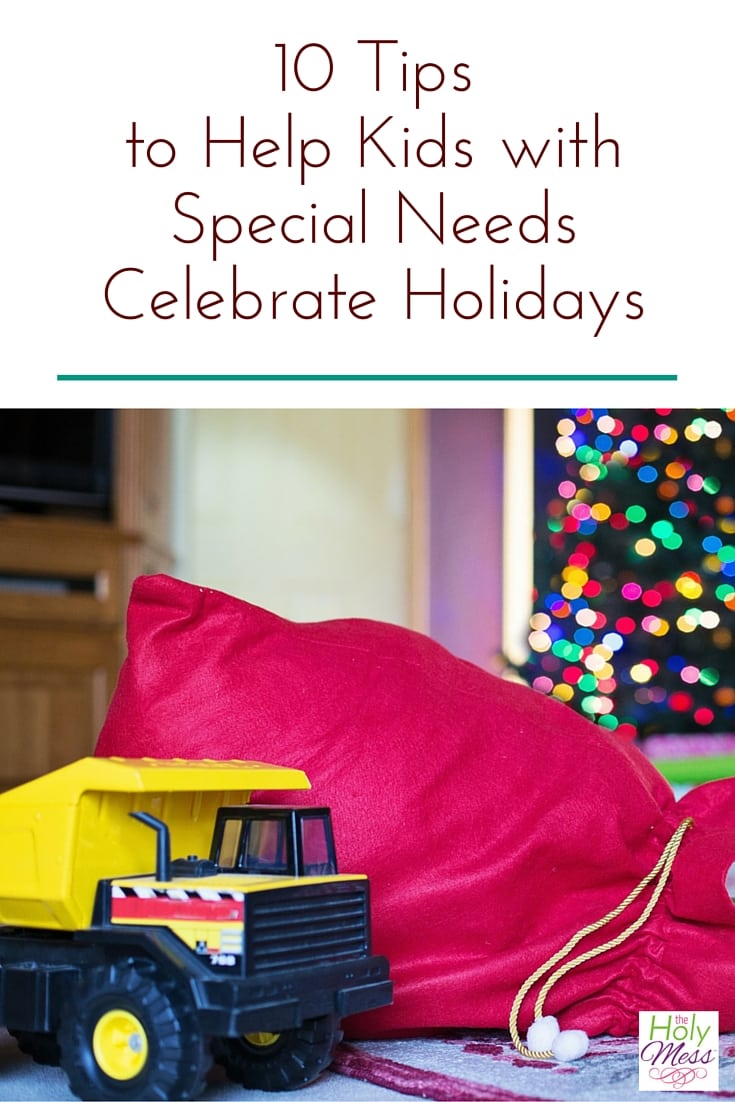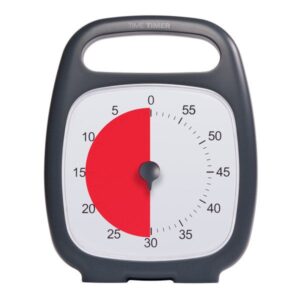
If you are a parent or a caregiver of a child with special needs, you know that the holidays are not always fun and joyous. Using my experience of many years of parenting children with special needs, plus help from a friend of mine, Riverbird, we have put together a guide with tips to help kids with special needs celebrate holidays.
As a parent of children with special needs, I sometimes think of my kids like a spinning toy top.
A typical child gets wound up and excited over something thrilling like a party or a holiday. A typical kiddo will spin fast. Picture this as a child who gets too overexcited to the point that he or she melts down and cries, and maybe has a tempter tantrum. A holiday can be overwhelming, but generally it’s a good time.
For a child with special needs, picture this child spinning and spinning, and he or she CANNOT stop spinning. This child will spin until he flies right off the table, crashes to the wall and hits the ground. This can look like huge tantrums, hours long melt downs, self-harm, lying, stealing, hurting others, running away, and many other dangerous reactive behaviors.
A child with special needs might have some coping skills and be able to calm herself some of the time or for a while, but it’s important for the adults in this child’s life to realize he or she needs assistance.
This is a tough concept for many of us to understand. It seems cruel somehow to keep things super-simple at the holidays for a kid with special needs. Here’s a kid who has already had a rough go in life, and we are saying they need LESS than what a typical kid would get at Christmas or for a birthday party?
My answer? A resounding YES.
Too much of anything is still too much, even if it’s good things.
Your child is not going to enjoy the event, the day, or the presents, if he or she is in total melt-down mode. Stay home, do less, or give less, and don’t feel guilty about it for a second.
Don’t spend one more second worrying about what other people think, either. If they don’t get it, that’s their problem. You know your family best.
My friend Riverbird, who herself spent time in foster care as a child, and as an adult has experience working with children with highly intense special needs, has developed a list of ways parents and other adults can help children with special needs during the holiday season. She has graciously given me permission to share her wise concepts with you here.
How to Help Kids with Special Needs Celebrate Holidays
1. Give kids a safe space where they can escape.
Well-meaning parents sometimes say things like, “Don’t be rude and ignore our guests!” While it is important to teach manners, it’s helpful for kids to have a place where they can go and veg out away from the crowd, especially if they are about to blow up. Some children will go to this place on their own, and others will need reminders to take space. Some will want to be alone, and others will find this isolating and want someone to go with them.
All of us need to recognize when we need a break and advocate for ourselves to take one, so this is teaching kids a life-long coping skill.
2. Set a schedule.
I’ve written before about how kids thrive when given a routine and schedule. The higher the child’s level of need, the more important a schedule and routine becomes. Flexibility is okay, but give structure and talk through what will happen each day and what happens next. Create a written or picture schedule. Downtime may feel great to you, but it is stressful and overwhelming for many children with high anxiety.
3. Transitions — the before time.
Give kids a heads up about what is happening next, but take care not to give *too* much advanced notice. Kids with high anxiety create worry in their minds when given too much notice. I recommend the Time Timer for children and adults with anxiety issues (our therapist’s recommendation).
Depending on the age of the child, I typically give warnings like, “In 30 minutes, we’ll be leaving for grandma’s house.” “Ten more minutes until we leave.” “One minute and we will get in the car.” I also set clear behavior expectations — no more than 2 positive-set intentions. “I expect that you will sit quietly in the living room and play with toys without running around the house at grandmas. You have done such a great job of behaving like a 9 year old lately. I know you are going to do really well with this.”
4. Transitions — the after time.
Riverbird explains this perfectly:
Kids who have been through trauma and have other mental health issues often lack the ability that others have to calm their emotions. Most people can get excited about something, but then settle down again once the excitement stops. But these kids can’t do that. Think about playing a fun, active, laugh filled game with a 2-year-old. They’re excited, engaged, and want to keep playing and playing. Now imagine you were to suddenly stop playing the game, put the child in bed, and tell him to go to sleep. Probably wouldn’t work too well, right? In this way, these kids are much more like two year olds. Though it may be hard to see on the outside, they still have the fun emotions going crazy inside but the fun activities have stopped, leaving them without a way to handle it. Since it’s hard for them to settle their minds down by themselves, they often end up acting out as a way to get the energy out. So, make sure activities have a wind-down time afterwards, as well as some sort of re-entry activity into usual routine. For example, ‘In 20 minutes our guests are going to leave, and when they do you and me can read a book together just the two of us.’ Focus on something simple and enjoyable that you and your child can do together. Having a calm presence with them can help them to settle themselves more easily.
5. Recognize the Let Down.
Riverbird explains:
Another issue that may cause upset feelings after a fun activity is the let down afterwards. For someone who does not regulate emotions well, emotions are felt on a roller coaster. My analogy is that some days I’m a roller coaster, some days I’m a river. When I’m the river, the good and the bad come together to change the flow slightly and add some bumps here and there, but mostly the river keeps flowing. When I’m having a roller coaster day I feel super high highs that are almost always followed with super low lows. I get involved in doing something that makes me feel amazing, which is great, but unfortunately it is almost always followed by the low drop. So I’m not saying don’t have fun, but make sure some of it is calming fun. Depending on what your kid likes, maybe some extra cuddle time, a quieter game, etc. If you’re go go go all the time, you’re bound to have a crash at some point since that’s obviously not sustainable forever. Also, keep in mind through all of this that being upset after an activity doesn’t mean that they didn’t like it. In fact it could very well mean the opposite. They may have had such a great time that it’s confusing to go back to the normal.
6. Keep expectations small.
Release those dreams for the picture-perfect Hallmark holiday, and allow yourself to mourn the loss.
Enjoy the little moments with your child as they happen. Plan some breaks for yourself or with your spouse or other children, and do not feel guilty about taking time away.
Recognize that your child wants to please you and make you happy, and they are fearful that they will mess it up. A holiday means they have a whole year to wait before they can try again to get it right. Some children will sabotage and blow up at the start to just get it over with. They cannot handle the stress of trying to be good. This pressure is even more intense for foster kids, who may feel like they have to be good to be accepted by the family (especially if there’s more family around than they’re used to, or if they have traumatic memories connected to the holidays).
7. Keep it simple.
Come late to events or leave early. Let go of traditions that weigh you down or have many involved steps. Buy fewer gifts. Decorate less. Buy pre-bought cookies and decorate with simple items. Focus on the main goals of togetherness and fun, and be realistic about what your child can handle. Too much of any good thing makes it not good anymore.
8. Foster/adoptive kids might miss their families, even if they don’t know them.
Riverbird shares:
For some kids, like me, holidays were an extremely traumatic time. They brought out the worst in my parents, and also gave them a tool to use against me. Something like Santa is a dream come true for controlling parents. One year Santa skipped my house. In hindsight my parents probably got drunk and forgot, but at the time I was crushed. In my mind, I was such a horrible person that not even this wonderful, loving, caring, mythical man wanted to give me anything. It’s not that I spend the holidays sitting around thinking of the bad memories, but a lot of different things trigger stress and anxiety…often without me even realizing that that’s what’s going on. I have less extreme memories with other holidays, but let’s just say anything family focused is tough when you have a family that’s struggling.
But even for a kid that doesn’t have traumatic memories of the holidays, the holidays are still a reminder of what a family “should” be. For a kid who is uncertain of his future, the idea of family is painful. Even kids who were adopted at birth and never knew their biological family may spend time wondering what things would’ve been like with their birth family. They may not even realize they’re doing it, they may just be feeling a bit of extra emptiness that they’re not sure how to fill or what it’s from. Unfortunately there’s not a lot you can do on this one, except just to be aware. Give them time to feel sad if they need to. Let them help invent new holiday traditions, especially if you know they’ve had trauma around the holidays. Creating a whole new family tradition that they’re involved with from the start gives them a new focus, helps them create new memories, and best of all gives them a sense of belonging. It’s possible they’re feeling like your traditions are yours, not theirs, and they’re just floating on the edges no matter how much you try to include them.
9. Give them a break, but not too much of one.
Approach the holiday time with understanding. Point out to your child patterns that you see, and help them start to connect the dots. Use compassion. Ask them for suggestions of how they would like to manage their problem behaviors. Kids are amazingly intuitive and wise when given a chance. However, don’t cut them too much slack. Have understanding, but keep expectations similar to what you always have so that you remain consistent and your children feel safe.
10. Have fun!
This doesn’t all have to be gloom and doom! Laugh at yourselves and the sometimes crazy predicaments that a special needs life throws your way. Enjoy the release of typical and create your own new way of celebrating the holidays that is outside the box. Cherish a holiday that is uniquely yours.
Savor the good moments. One thing I can say as a mom of children with special needs is that the small, peaceful moments are so exquisitely beautiful to me now. I have an appreciation that I never had before, and this is a gift.

What strategies have you found helpful for your children with special needs?
Also check out:
The Voices of Parents of Children with Special Needs
Special Needs Parents Resource Page
My Holiday Hope Toolbox Printable Kit — Free for a limited time!








These is a great list! Although my kids don’t have special needs, they are definitely prone to holiday overload, so these reminders are great for us as well!
All great tips! Thanks for joining the linkup, Sara!